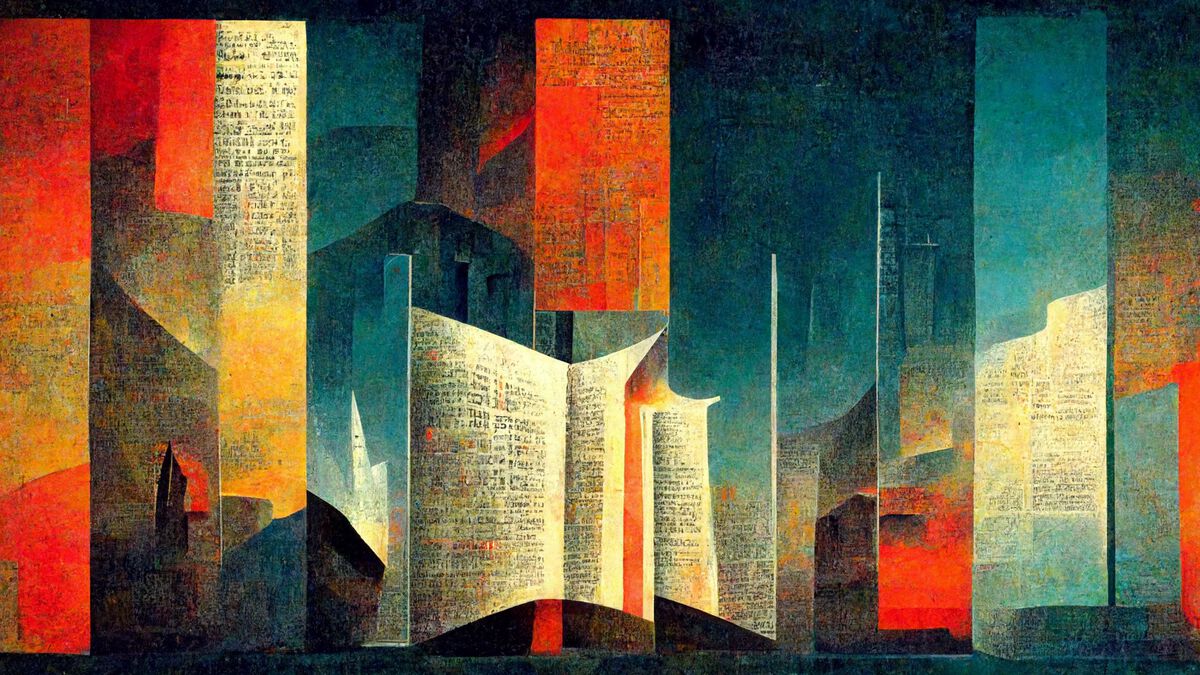Faithful Mormon Transhumanism
Lincoln Cannon
27 February 2023 (updated 3 January 2026)
A friend is exploring Mormon Transhumanism. He finds it “mind-expanding” and “faith promoting,” and even an “honest, authentic, and unexpectedly practical approach to religion.” But he’s also tentative about it, mostly because his “desire to remain in the mainstream of the Church is strong.” And he wonders whether and how both are possible.
This friend isn’t alone. I’ve had the opportunity – really, the good fortune and privilege – to talk with many friends about such perceptions over the years. They recognize the practical power of a Transhumanist approach to our religion. And they wonder how best to take advantage of that power without losing or harming their relationship with the Church and culture that they love and support.
I know about this first-hand too, although somewhat differently than some of my friends, who encounter Transhumanism from a place of faith. I had lost my faith when I encountered Transhumanism. And Transhumanism was a major reason that I eventually regained my faith. It probably also contributed substantially to keeping me in the Church.
Below are some questions that my friend sent me. Each is followed by some of my thoughts in response. And the thoughts include links to other articles that elaborate more. Hopefully this will be helpful, both for my friend who sent the questions and for other friends (current and future) who read it.
Prayer
“Do you pray? Who do you pray to? How do you pray?”
I pray to God in the name of Christ. That’s the short answer. There are many longer answers. I’ll elaborate a bit.
My aspiration is to pray always, as Nephi in the Book of Mormon encourages us to do. I want my thoughts, words, and actions to be prayers – always. I want them always to be expressions of courage toward creation of compassionate worlds, following the example of Jesus Christ.
Of course I don’t always live up to this aspiration. But it’s my aspiration nonetheless. And of course I can’t pray always in formal ways. That wouldn’t be practical.
But I do pray formally. Most of my formal prayers, from a Mormon perspective, take unsurprising forms. I pray formally at Church, before meals, with family, and with friends. I also participate in formal prayers with persons of other faith traditions, as opportunities permit.
When I pray formally, I usually close my eyes. Sometimes I kneel, depending on the context. Again, nothing about this is surprising, from a Mormon perspective. When praying with persons of other faith traditions, I’ll sometimes adopt their formalities, such as holding hands around a table for a prayer before a meal.
I pray in the name of Christ. By this, I mean that I try to follow the example of Jesus. And I take seriously his invitation to join him in Christ, taking on that name and role to the best of my ability.
And I pray to God. By this, I mean that my intention is directed toward God in the most holistic sense, reflecting the whole breadth of Mormon theology. Principally, that is the creator of our world, who represents our superhuman potential. And it also includes expressions of God in our community and environment, and in me.
Prophets
“Do you believe that scripture and revelations are knowledge from our creators given to prophets? Do you believe that the our prophets have an elevated interaction with God(s), and receive knowledge from them to guide the church and humanity?”
I’ve recently written at length about my perspective on scripture. In summary, I esteem as scripture that which we receive from the Holy Ghost – the sublime esthetic. Of course that includes formal authoritative scripture, when we read it with inspiration. And it also includes any other text, not necessarily with any authoritative weight, when we read with inspiration.
I esteem scripture and revelation to be primarily esthetic matters – spiritual matters. They can and should also provide knowledge in the sense of shared edification and understanding. They don’t necessarily provide knowledge in a scientific sense.
I esteem prophets to be persons who sense and articulate the Holy Ghost – the sublime esthetic. Their primary function is to provoke us to change for the better, warning us of risks and encouraging us with opportunities. As the New Testament teaches, anyone who expresses their experience of Christ is functioning as a prophet. But not all prophets have authoritative weight.
In the Church of Jesus Christ of Latter-day Saints, we formally recognize particular persons and texts as prophets and scriptures. They have authority in the Church. And I support them – or, as we say in the Church, I sustain them. That doesn’t mean that I esteem any of them to be infallible.
I support Church authorities, despite whatever imperfections I perceive, for many practical reasons. Those reasons include recognition of the power of solidarity. They include desire toward ever-greater reconciliation, knowing that I need as much grace as anyone else. And they include observation that, even for God, authority is always aspirational and co-created.
I don’t think Church authorities inherently have any more or less access to God than anyone else. And I don’t think God only works through Church authorities to guide humanity at large. But I do think Church authorities are uniquely positioned to guide the Church effectively. And I think they do that most effectively, not only when seeking inspiration in solitude, but also while counseling to the best of their ability with all Church members.
Miracles
“Do you believe that ‘magical’ events and tools like visions, seer stones, etc., are interactions with superhumans who are guiding humanity? Do you believe that the priesthood and ordinances provide power from God to humans – beyond the power that comes from visualization or the placebo effect? Like do you believe in priesthood blessings and miraculous healings – or miracles in general?”
The science fiction writer Arthur C. Clarke once observed that “any sufficiently advanced technology is indistinguishable from magic.” I have a corollary to his observation. Any sufficiently advanced intelligence is indistinguishable from God.
I do believe that apparently magical events and tools can and do exist. From the perspective of many of our ancestors, if they could see us, we already live in a magical world. And from many of our perspectives, if we could see them, our descendants probably will live in a magical world.
We trust that the engineering around us, no matter how magical in our experience, has a technical explanation. Maybe we can provide that explanation ourselves to some extent. And we trust that someone else could provide an explanation for the rest of it. Yet that still doesn’t always displace, or even diminish, the experience of magic.
In the Mormon tradition, reflecting our scriptures, we often use the word “miracle” to describe such magic. In so doing, we don’t mean that there’s no possible explanation for the experience. At least that’s not what Mormons who are well-versed in our authoritative tradition mean. Rather, we just mean that the experience is miraculous in quality, although surely there’s an explanation that at least God could provide.
Joseph Smith provided one of the most thought-provoking accounts of our cosmos. In a revelation that now appears as the 88th section of the Doctrine and Covenants, Joseph claimed that law is pervasive throughout space, although law may differ from one space to another. He also described God as comprehending all law, and giving all law.
To my understanding, this account is perfectly consistent with our understanding of science and practice of engineering. In science, we seek to understand the laws of the context within which we find ourselves. And in engineering, we seek to create artificial environments that change local experience – local laws.
Although this is applicable to all technology, it’s perhaps most obvious when we think about the engineering of computed worlds. For example, think about the new game, Hogwarts Legacy. In that world, people can engage in all kinds of magic that we’re not accustomed to seeing in our world. But Hogwarts Legacy yet remains firmly embedded in our world and its physics.
There are of course countless interesting questions about whether and why miracles occur in our world, here or there, now or then. And I can’t address them all here. But, generally speaking, I do trust that we live in a world that is created by superhuman intelligence. And I do trust that they can, within the constraints of their law, make changes to our law.
None of this means that I reject consensus scientific theories. To the contrary, I have high esteem for consensus science, and particularly for evolution theory. It’s by far the best explanation for a host of observations related to human origins. But, contrary to what too many too easily suppose, evolution theory is perfectly compatible with the existence and concern of superhuman creators – evolving Gods.
I trust that humanity can and should participate in such creation. We are children of God, as the good book says. As children learn to become like their parents, so we should learn to become like God – superhuman creators. That includes learning to console and heal and otherwise create to miraculous extents.
Priesthood in itself is not such power. Joseph Smith clearly explained that priesthood in itself is only authority. Power must come naturally by ethical use of authority. Otherwise, authority undermines itself into irrelevance or worse.
Placebo is greatly under-appreciated in popular culture. It’s not fake. Placebo is real, or at least a placeholder term for that which is real. And placebo is so powerful that all serious studies in human sciences must account for it in order to be taken seriously.
I’ll take all the placebo I can get. But placebo isn’t enough. I also want engineering that leverages whatever we’ve learned from placebo-controlled science.
I suspect God works with us along these lines, through a combination of what we might describe as placebo and science. Miracles, whether of consolation or healing or otherwise, may be a combination of the two. And they may involve that which, for us, is at-present only potential science. After all, I’m not going to tell the Matrix Architects what they can or can’t do in the world they compute.
Jesus
“Do you believe that Jesus, the man we read about in new testament scripture, is a being from a post-human civilization (our creator) who lived on earth among humans?”
I revere Jesus of Nazareth as Christ. I understand him to have invited you and me and everyone to join him in Christ. And that invitation is particularly potent when we assert, as Joseph Smith stated in revelation that became the 93rd section of the Doctrine and Covenants, that we all have the same origin and potential as Jesus.
Some esteem Jesus to have been only kind of like the rest of us. For them, it’s a way of expressing how sacred his example is to them. And I respect that feeling, to that extent. But the associated perspective can and too often does have negative consequences.
When we esteem Jesus as having origins, potentials, and capacities that differ considerably from our own, we weaken the potential impact of his example on us. We segregate out things that only Jesus could do or say or think. And that marginalizes what we could do or say or think comparatively. So we don’t try, as much or at all, to follow his example fully.
So far as I can tell from the scriptures, and from whatever wisdom and inspiration I might have, that’s not what Jesus wants. To the contrary, Jesus invites us to share with him all of the titles and roles that we ascribe to him. Whether it’s sublime origins or sublime potentials, whether it’s suffering on the cross or rising in eternal glory, Jesus asks us to be one in them all with him.
If premortal Jesus came from the Gods, so did we. If postmortal Jesus rose to the Gods, so shall we. And so we discover and create worlds without end, if we are one with Jesus among the Gods.
With that context, I’ll add what is, at least for me, a deeply sobering thought. Jesus suffered. All creators suffer. And most assuredly the greatest creators suffer most greatly.
In Mormon theology, heaven is not a simple place where unicorns fart rainbows, so to speak. Heaven is where God weeps. The creator weeps for, with, and in the suffering of creation. And eternity shakes.
Perhaps we, Mormons, too often too quickly aspire to share in the divine glory – to abide Celestial glory. Already this world weighs on us, the limits of humanity. How ready are we to become the limits of superhumanity?
I can’t answer that question for everyone. But I can say that I’m not ready. I have much to learn. For now, I’m probably well-suited for this Telestial glory in which we live.
And I’m deeply thankful for the example, the inspiration, that Jesus provides – especially because I’m in awe of the notion, the trust, that he was like me.
Apocalypse
“From what I understand, you believe that our development and perfection will be part of the second coming of Christ. Do you also believe that a millennium or second coming will involve the arrival of superhuman beings?”
I understand the return of Christ to be about human transformation, as much as about anything else. Humanity has, I trust, sublime potential as superhumanity. But that trust has logical implications, which in turn have practical implications. Sublime aspirations are logically coherent only within a possibility space that includes sublime origins.
In other words, we almost certainly won’t become superhumanity unless superhumanity already exists. We almost certainly won’t be the only or first to pass the great filters, the catastrophic and existential risks, the powers that guard the path between human and superhuman intelligence. If superhumanity doesn’t already exist, it’s far more likely that we’re doomed to destruction and eventual extinction.
But if superhumanity does exist, we have a real chance. I think it would be foolish to characterize it as a certainty. But I do think it would be a real chance, to survive, to prove ourselves worthy of trust, and to thrive.
And in that case, I imagine our transformation coinciding with the revelation of our creators – the apocalypse of our creators. When they appear, we will be like them, the scripture says. Or, as expressed elsewhere in the scriptures, we become such that our creators can no longer prevent us from seeing them.
Conclusion
In conclusion, I want to stress that these are my perspectives, the perspectives of just one Mormon Transhumanist. They aren’t the only right perspectives, for Mormon Transhumanists or otherwise. I constantly learn and otherwise benefit from friends and others who engage in the exploration of these ideas.
I also want to point out that the Mormon Transhumanist Association is diverse. Most of us are also members of The Church of Jesus Christ of Latter-day Saints, and theists. But some of us are members of other churches or no church. And our perspectives on God include atheists who believe God just doesn’t exist yet.
What all Mormon Transhumanists have in common is high esteem for the intersection of Mormonism and Transhumanism, and a recognition that this intersection helps us and others participate more effectively in the shared task of making a better world. If you feel that esteem and recognize that utility, you’re already a Mormon Transhumanist in spirit. And of course there are many Mormons who’ve never heard of Transhumanism that are nonetheless implicitly Transhumanist.



